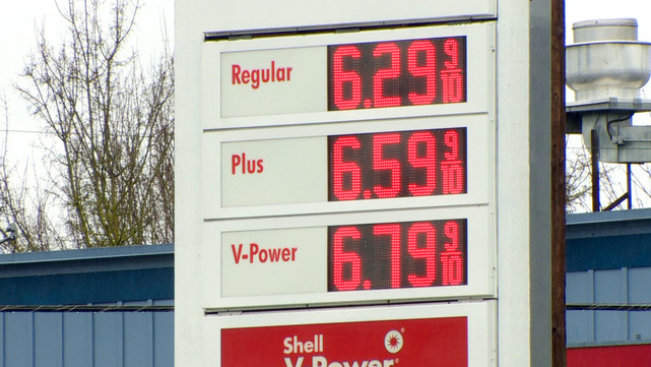Gas Prices vs Businesses
Northeast Portland gas station charging nearly $6.30 for a gallon of gas on March 2nd
April 21, 2022
You might have noticed that gas prices have increased continuously for a gallon throughout the past few months. This is because of the uprising of travel since the mask mandate for Oregon was lifted at 11:59 p.m. on March 11, 2022. Supply and demand market forces determine petroleum prices, so individual companies aren’t just profit-hungry. Another reason why the price has increased is due to President Joe Biden announcing that the U.S. will ban imports of oil, natural gas, coal, and some petroleum products from Russia. Unfortunately, Russia’s President, Vladimir Putin, created turmoil and started an invasion of Ukraine on February 24th, 2022. Federal, state and local government taxes also contribute to the retail price of gas. Unfortunately, pump prices are still highly likely to rise as crude oil prices continuously rise.
As of March, most Uber and Lyft drivers are not happy because of the minimal profit they achieve. Some drivers are saying, ‘they’re paying double in fuel costs compared to just a few months ago.’ This may result in higher-priced drives or just consequently quitting. According to NBC News, riders taking Uber trips will pay a fee of $0.45 to $0.55 per trip, and Uber Eats deliveries will include a $0.35 to $0.45 surcharge, the company said. Depending on your location, length, and duration, passengers are expected to pay the slight charge, and one hundred percent of the money will go straight to the driver. Luckily for Oregon, our state’s price for fuel isn’t as bad as it is in Hong Kong, clocking in at an estimated $10.89 for a gallon. The reason it’s so high in Hong Kong is because of the surging increase of land for building gas stations, and importing it, taxes, final wages and marketing.
The increase of gas prices may begin to affect some businesses by inflation rising higher at the fastest annual rate for forty years. The uncertain price of petroleum heavily impacts transportation and delivery services companies. In contrast, others may be forced to re-evaluate their hiring plans due to being unsure about the economy’s health. With more people spending extra on gas, that leaves less money for consumers, therefore may impact the companies selling products. This is called inflation, causing a ripple effect in the economy.
As a result, this affects the economy while transportation companies, like airlines and large delivery companies, are mildly affected. If sky-high prices continue to rise, it could lead to falling consumer demand for all sorts of products as people tighten their belts to offset the higher cost of daily needs. This may result in grocery prices increasing, while six to ten percent of food prices come from transportation costs, and as gas still increases in price, it is likely that the cost of groceries will increase. Many plastics that are used in packaging and clothing are also made from petroleum products.
Gas prices genuinely do affect our economy and businesses. The main reason for this is the increased demand for travel, the mask mandate being removed from Oregon and taxes. The economy’s health may change over a few months, or hopefully, a setback will provoke things back to normal.





